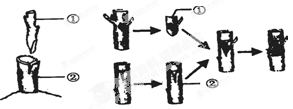材料一:作为一个有着崇高追求的执政党,中 * * 党必须承担起推动文化繁荣发展的责任。既要自觉地立于文化的潮头,用先进文化引领社会思潮,促进社会进步;又要用民族优秀文化滋养民族生命力,建设好中 * * 的共有精神家园;还要满足人民精神生活需求,着力提高全社会的文化生活质量;还需树立强烈的忧患意识,维护国家文化安全,在激烈的国际竞争中不断增强中国文化的整体实力和扩大中华文化的国际影响力。
材料二: 《中 * * 关予深化文化体制改革、推动社会主义文化大发展大繁荣若干重大问题的决定》起草工作是在中央政治局常委会直接领导下进行的。中央要求,《决定》起草要充分发扬民主,注意吸收各方面意见,做到科学决策、民主决策。文件起草组组成8个调研组,分赴12个省市和部队开展调研。文件起草组在充分吸收和采纳各方面意见的基础上形成文件框架提纲和《决定》初稿。中央政治局和中央政治局常委会多次审议,提出重要修改意见。经反复修改,形成《决定》征求意见稿。这期间,胡 * * 同志主持召开座谈会听取了各民主党派中央、全国工商联负责人和无党派人士意见。
⑴ 结合材料一,运用《政治生活》知识,分析中 * * 党大力发展先进文化的原因。(6分)
(2)结合材料二,说明《决定》的起草过程蕴含了哪些政治生活道理?(6分)
(1)①中 * * 党是执政党,是中国特色社会主义事业的领导核心。中 * * 党要担负起发展先进文化的责任。(2分)②中 * * 党是中国工人阶级先锋队,是中国人民和中 * * 先锋队,党的宗旨是全心全意为人民服务。中 * * 党要从国家、民族和人民的利益出发,引领先进文化的建设方向。(2分)③中 * * 党坚持科学执政。党遵循经济建设规律、社会发展规律的要求,大力发展先进文化,促进社会进步。(1分)④党坚持以人为本。 党大力发展先进文化,满足人民对提高国家文化水平的期望。(1分)
(2)①《决定》起草工作是在中央政治局常委会直接领导下进行的体现了中 * * 党是中国特色社会主义事业的领导核心,是我国的执政党(2分)②中 * * 广泛听取意见建议,做到科学决策、民主决策,体现了中 * * 党坚持科学执政、民主执政。(2分)③召开座谈会听取了各民主党派中央、全国工商联负责人和无党派人士意见体现了我国实行中 * * 党领导的多党合作和政治协商制度(1分)④体现了中 * * 党和民主党派是通力合作、共同致力于社会主义事业的亲密友党,各民主党派是参政党。(1分)
本题以《中 * * 关予深化文化体制改革、推动社会主义文化大发展大繁荣若干重大问题的决定》为背景。考查学生对中 * * 党知识的理解。
* * 党大力发展先进文化的原因可以从党是执政党、领导核心、宗旨、地位、执政方式、以人为本等方面分析。(2)《决定》的起草蕴含政治生活道理可以从党是领导核心、执政方式、多党合作和政治协商制度、与各民主党派关系等方面分析。

